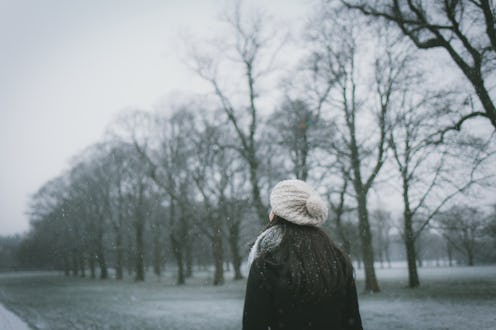
Gather 'round, everybody, because we have some important information to go over before the winter solstice arrives. You've probably heard a lot of winter solstice superstitions in your time — but what do they mean? Why do we follow them? Are any of them actually true? It can be useful to separate the facts from the myths,
In 2016, the winter solstice falls on Dec. 21 — but only for those of us in the Northern Hemisphere. In the Southern Hemisphere, it's the summer solstice. That means that two different things will happen on the same day: In the Northern Hemisphere, we'll experience the shortest day and longest night of the year; as Earthsky puts it, we'll see a late dawn and an early sunset. If you live in the Southern Hemisphere, though, it's the opposite: You get the longest day of the year and the shortest night.
Regardless as to whether you're experiencing the summer solstice or the winter one, though, the event itself will occur for everyone at the same time. (This is because, according to Earthsky, "it’s when the sun on our sky’s dome reaches its farthest southward point for the year.") This, of course, makes it ripe for tons of superstitions and traditions. After all, the fact that everyone on Earth experiences a solar shift at the same exact time is a pretty poignant reminder that no matter where we are, some experiences truly are universal. The idea that we are all connected is, I think, one of the key foundation points for many superstitions behind the winter solstice.
So what are some specific winter solstice superstitions and traditions? Are any still practiced today? Let's break down some history together.
Gathering At Stonehenge To Watch The Sunrise
Every year, record amounts of people travel to Stonehenge, England to watch the sun rise on the shortest day of the year. According to IB Times, 3,500 visitors arrived last night and watched the sun connect between the three stones at Stonehenge: the altar stone, the slaughter stone and heel stone, meaning that this is one winter solstice tradition still alive and well today.
Decorating Fur Trees Outside
The Druids (ancient priests for the Celtic peoples) believed that evergreen trees, which we typically see as Christmas Trees, were symbols of everlasting life. On the winter solstice, it was common for people to go and decorate these evergreens outside. Unlike our tradition today, people did not cut down evergreens and decorate them in their homes, as it would have been unnecessarily destructive to the environment.
Burning Yule Logs Around The Fire
The Celts often burned wood to provide warmth and fire, especially during the winter. For the winter solstice, it was a tradition to keep an entire yule log, which was often the trunk of a tree, burning for 12 hours. If this fire did not go out, explains Dr. Leonard Perry at New England-focused website The Heart Of New England, people believed that the household "would be protected and see an abundance of crops, good health, and other desirable things in the coming year."
Making Food For Deceased Family Members
A common way people in Europe celebrated the winter solstice was to make enormous dinners — in particular, a huge meal on Christmas Eve that involved 12 separate dishes. Interestingly, to honor the winter solstice, people often put together meals for deceased family members.
Trading Gifts With Family And Friends
As explained at Time and Date, the ancient Romans were big on giving gifts to honor the winter solstice. Like most traditions, this had a lot of symbolism, right down to the present of choice. Imitation fruit, for example, was a popular choice, as it was a symbol of fertility. Dolls were common as well, as a nod to the tradition of human sacrifice. Candles were another norm, as they were a reminder of bonfires often associated with pagan solstice events.
So if giving gifts for particular religious holidays doesn't do it for you, you can always gift in honor of the winter solstice. After all, we all experience it — and we could all use a little extra unity and goodwill right about now.
Images: Paul Green/Unsplash; Tookapic, Adrianna Calvo/Pexels